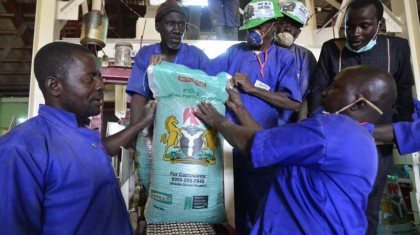The Presidential Fertiliser Initiative (PFI) of President Muhammadu Buhari’s administration has created about 120,000 jobs within 10 months.
Mr Thomas Etuh, a member of the PFI, made this known while speaking with newsmen in Abuja on Tuesday.
Etuh, who is also the President of the Fertilisers Producers and Suppliers Association of Nigeria (FEPSAN), said that about 8.5 million bags of fertiliser had been produced under the government’s agricultural programme.
According to him, the government is planning to produce and deliver about 13 million bags of fertiliser to farmers by the end of this year.
“The good news about the PFI is that it has created about 50,000 direct jobs in the country. Not less than about 70,000 indirect jobs have also been created.
“When you go to virtually every fertiliser blending plant, you will see that it has become a marketplace with many people selling all kinds of things.
“When you look at the value chain, the thread used in sewing fertiliser bags and even the bags are produced by different companies; such companies were dead before now but they have been revived.
“When you count the number of bags used in bagging fertiliser, they are in millions; even the spare parts we use and other consumables, these are all the value chains reaping the benefit of the PFI,” he said.
Besides, Etuh said that Nigeria had produced 7.5 million tonnes of maize under the current agriculture initiative, while saving about N60 billion in fertiliser subsidies between January and September this year.
The FEPSAN chairman said that 15, out of the existing 32 moribund fertiliser blending plants, were now working perfectly to facilitate the government’s efforts to attain its food sufficiency target in agriculture before 2019.
“Our aim is to get 18 blending plants working by March 2018,” he added.
Etuh said that it was erroneous for anyone to say that the Buhari-administration had not created jobs, adding that over 50 per cent of the moribund fertiliser blending plants in the country had been revived with many workers employed in the process.
“Even the printings on the fertiliser bags are part of the jobs that have been created. When you count the benefits in terms of value chain, you will see that they are inexhaustible,’’ he added.

